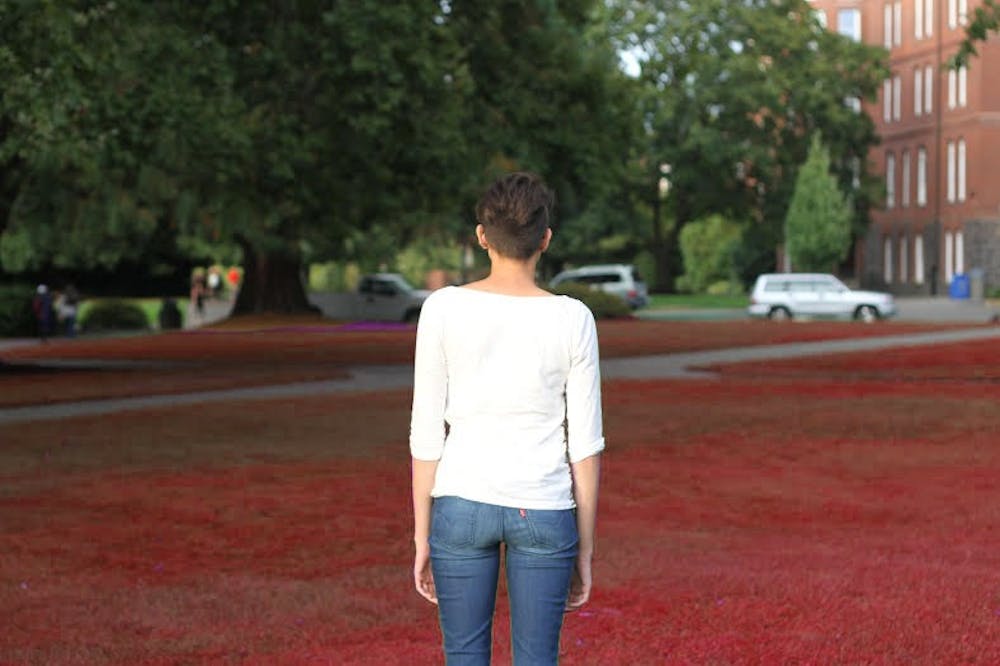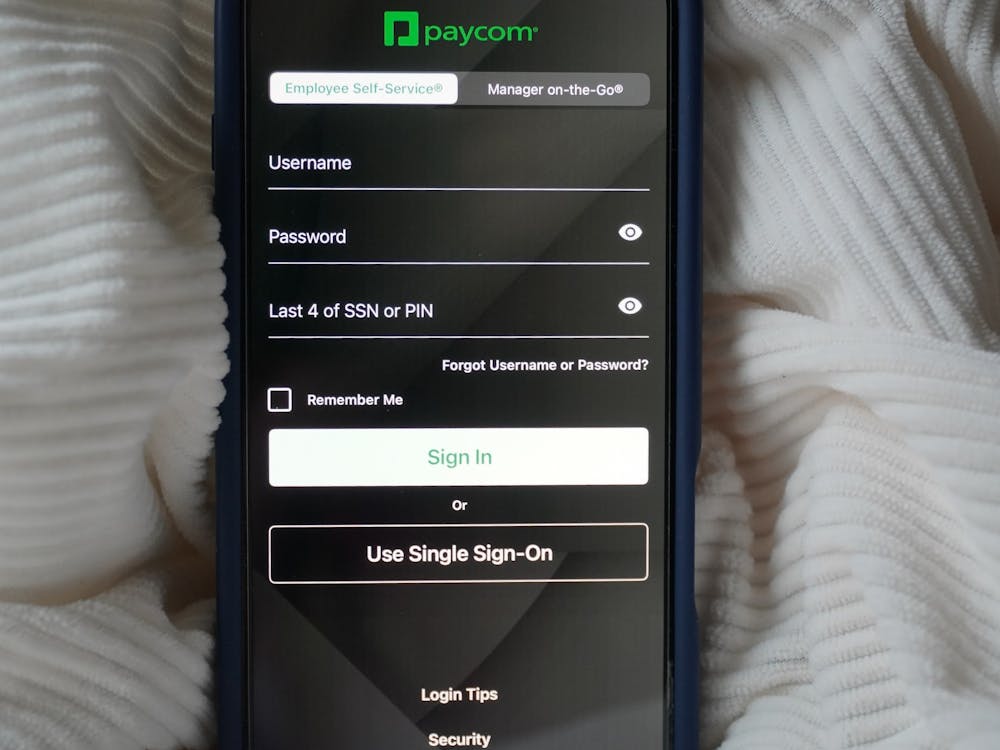by Lydia Laythe |
Every fall, college women - especially freshmen - are at a greater risk of sexual assault.
According to the 2007 Campus Sexual Assault Study by researchers in North Carolina, more than 50 percent of college sexual assaults occur between the beginning of fall semester and Thanksgiving Break. The study also found that female underclassmen were most at risk.
This risky fall period has come to be known at colleges nationwide as the “Red Zone.”
Student Experiences
Last year, The Beacon interviewed an anonymous student for an editorial about sexual assault. The student, “Laura” opened up about the assault she experienced during this “Red Zone” time period, her sophomore year at UP.
Laura awoke one morning after a night of partying, and couldn’t remember what had happened the night before. She admitted she had drunk too much, and her friends filled in the hazy parts of the night. They told her she had left the party for a while with another UP student she had just met. As the day went on, she began to remember the sexual assault that had occurred while she was intoxicated.
“It was so traumatizing, horrifying,” Laura said. “I was crying all weekend about it. It was so scary.”
After several harassing text messages from the accused perpetrator, Laura decided to report the incident using campus resources. Immediately the University helped her establish a no contact order with the accused. Under a no contact order, the provost checks both students’ schedules every semester to ensure they don’t have any classes together. If they see each other on campus, the accused has to walk the other way.
The case did not go the way Laura had hoped. The accused still attends UP. The agreement with the University forbids Laura from publicly identifying him (other than to select friends and University-approved professionals).
Laura’s report is part of the accused’s record at UP. If that student were to offend again, the sanctions might be far greater because of the previous accusation.
Moving Beyond the Pain
Joseph Rojo, a junior and ASUP secretary, is also a survivor of sexual assault. Being male and having been assaulted before stepping onto campus, Rojo’s story doesn’t fit the “Red Zone” criteria. But he shares his experience with the UP community in hopes that it will help other students who are suffering silently.
When Rojo was in high school, he became depressed. Motivated by a desire to “numb the pain,” Rojo began “working as a hooker.”
“During the summer of my senior year, I wanted out and I didn't want to do it anymore,” Rojo said. “One of the people I saw came and I didn't want to do it anymore and I wanted to stop but he didn't. So he just went for it.”
Rojo said this experience shattered his trust in relationships and made him uncomfortable with sex, intimacy and relationships in general.
Since coming to UP, Rojo has begun to open up about his experience, including a piece submitted to The Beacon last spring. He says opening up helped him move beyond the pain of what happened to him. And although his experience may have brought up emotional obstacles, it also gave him new awareness of what consent is – awareness that his peers may not have.
“There are things that the average college guy doesn't understand about assault,” Rojo said. “Such as: sexual assault is more than just rape, it's still sexual assault if the person changes their mind and doesn't want sex. Consent is fluid; people can change their mind and that needs to be respected, and it happens more than people think…”
Rojo said he wants to change the lack of messaging on campus for survivors.
“At the end of last year... someone came up to me and told me that they talked about the (awareness) posters I had made… and they wanted to know if I could do something to get the message of ‘It's not your fault’ out to people,” Rojo said. “When they told me that, it felt like I was just punched in the stomach because I remembered my own feelings about that and I realized that there was no support system and no way of telling someone who had been assaulted ‘It's not your fault.”
The messages Rojo hopes to spread to students are simple: one, it’s not your fault; and two, talk to someone and get help.
The Situation
The beginning of the year is an exciting time – especially for freshmen. They are in a new place, meeting new people, enjoying new-found freedom and participating in new activities – like going to parties and maybe drinking for the first time.
Gerald Gregg, Director of Public Safety, understands the challenges of transitioning from high school to college.
“Look, I was in college before you were born,” Gregg said. “All three of my children went to school here. I’m not surprised by what might happen on Saturday night… All of a sudden, you’re in college and there’s nobody cross-checking you on what’s going on, and (asking) is this a good idea?”
Gregg says good peer support and situational awareness are important for students to have throughout the year, but especially during their first few months on campus.
“(You need to ask yourself), ‘Where am I? What’s going on? Is this a good place for me to be? What’s my support network at this point?’” Gregg said.
Prevention
The pressure is on colleges and universities across the country to take sexual assaults among students seriously. The federal government is investigating dozens of universities accused of failing to respond to sexual assaults appropriately--bringing this topic to the forefront of the media’s attention.
At UP, the approach to sexual assault prevention and awareness is called “Green Dot,” a bystander intervention program.
Kristina Houck, former Green Dot Program Director, said UP’s approach to sexual assault prevention takes judgment away from the potential victim and potential perpetrator, takes the responsibility (and blame) away from the victim and calls the entire community to action.
“It’s this collective call to action – it doesn’t matter our gender, it doesn’t matter our age,” Houck said. “Its up to all of us to notice when something inside of us says ‘ There’s something not quite right here.’ And then to creatively think about ‘What can I do about it?’”
On Friday of Orientation Weekend, freshmen spent the afternoon in the Chiles Center with Houck participating in “Pilot Pride,” an information and training session in which they learned the values that build UP culture.
“We’re equipping them, hopefully, with the skills that will mitigate the risk of the next three weeks, but more importantly, we’re introducing them to this culture of ours that won’t tolerate violence, and that acknowledges that we all have a role in making sure violence doesn’t happen in our community,” Houck said.
Reporting
According to the Campus Safety and Security Data Analysis Cutting tool from the U.S. Department of Education, sexual assaults occurred at UP twice in 2011-2012, once in 2012-2013, and three times in 2013-2014. However, sexual assault is widely-known to be incredibly underreported, so there were likely many more incidents.
Students might fear reporting a sexual assault for many reasons. There might be social consequences if the perpetrator was a friend or close acquaintance. There might be emotional consequences if the survivor has to tell and retell the details of the offense. There might be fear of student conduct repercussions if underage drinking was involved.
But, according to the Life on the Bluff Student Handbook, “The University will not pursue the conduct process against a student who reports interpersonal violence for lesser policy violations that occur in connection with the reported incident.”
All these concerns can be discussed with confidential resources (listed below), such as Health Center counselors or campus ministers. Confidential resources can serve as supportive listeners and sounding boards, without any pressure to take action. Anyone who has experienced a sexual assault also has the option to report the incident directly to Portland Police, as sexual assault is not only a campus conduct violation. It is a serious crime.
Lydia Laythe is Opinions Editor for The Beacon. She can be reached at laythe16@up.edu.
Editor’s Note: Kristina Houck has left UP to go into private counseling practice and is no longer director of the Green Dot Program. Alex Hermanny, Associate Director for Community Standards, and Hannah Hoeflich, a counselor in the Health Center, will be interim co-chairs of the Community Against Violence Team, and that includes the Green Dot program. Eventually a new Wellness Education and Prevention Program Coordinator will be hired and will assume those responsibilities.
Did you know you could go to prison for sexual assault?
In Oregon, sexual assault crimes are categorized by degree. Rape in the first degree is defined in Oregon Revised Statutes 163.375 as when an individual has sexual intercourse with another person and (a) the victim is subjected to forcible compulsion, (b) the victim is under 12 years old, (c) the victim is under 16 years old, is the person’s sibling (whole or half), or is the person’s child or spouse’s child, or (d) the victim is incapable of consent. Rape in the first degree is a Class A felony and a Ballot Measure 11 Offense. Rape in the first degree can result in sentences ranging from 100 to 300 months in prison.
In ORS 163.305, sexual assault is defined as compelling someone to sexual contact through “forcible compulsion,” which includes by physical force or threat (expressed or implied), which places someone in fear of immediate and/or future injury or death (to self or another person).
What does Oregon law say about consent?
ORS 163.305 says an individual is incapable of giving consent to a sexual act if the person is under 18 years old, mentally defective, mentally incapacitated or physically helpless. “Mentally defective” includes someone dealing with a mental disease or defect that renders them incapable of understanding the nature of the other person’s conduct. “Mentally incapacitated” includes someone rendered incapable of understanding or controlling their conduct at the time of the offense (this might include someone under the influence of drugs or alcohol). “Physically helpless” includes a person who is unconscious or physically unable to communicate unwillingness to an act for any reason.
Reporting Resources:
Confidential Campus Resources: If you just want to talk…
- SAFE Advocates: Support and referrals for counseling, medical care and reporting options.
- 503-943-SAFE (7233)
- University Health Center: Individual counseling and medical care.
- 503-943-7134
- Campus Ministers: Pastoral and spiritual counseling.
- 503-943-7131
- Title IX Coordinator: Lauretta Frederking
- Frederki@up.edu
- 503-943-7291
- Public Safety:
- 24-hour non-emergency: 503-943-7161
- Emergency: 503-943-4444
- Office of Residence Life: 503-943-7205
- Portland Police Bureau: Non-confidential reporting.
- 24-hour non-emergency: 503-823-3333
- Portland Women's Crisis Line: Free and confidential emotional support, information and referrals, safety planning and crisis intervention. Survivors may remain anonymous.
- 24-hour crisis line: 503-235-5333 or 1-888-235-5333
- Sexual Assault Resource Center: Anonymous and confidential, free emotional support; case management and legal advocacy in Washington County.
- 24-hour crisis line: 503-640-5311
- Q Center | SMYRC: Resources, including confidential counseling for LGBTQ youth.
- 10 a.m. to 4 p.m., Monday-Friday: 503-872-9664
- National Sexual Assault Hotline: Confidential and anonymous emotional support.
- 24-hour: 800-656-HOPE (4673)
- Gay Men's Domestic Violence Hotline: Crisis intervention, confidential support and resources.
- 24-hour: 800-832-1901








